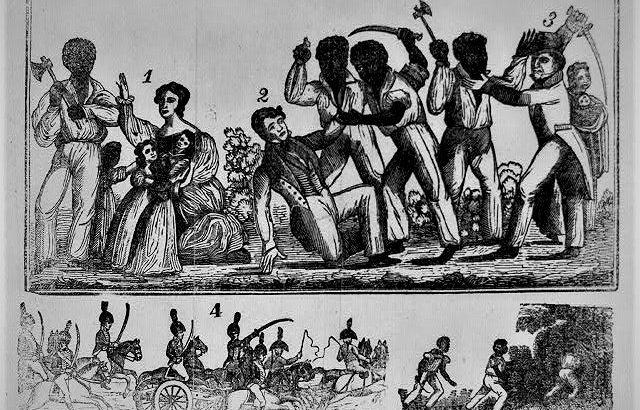August 21, 1831: The Nat Turner Slave Rebellion Begins
In early August 1831, Nat Turner, an African-American preacher and slave in Virginia, began planning and preparing a revolt against slavery. Beginning on August 21, Nat and others with him killed his master’s family, then mounted horses and continued the same on farms and elsewhere of slave owners and their families. After, the Virginia legislature received petitions urging the menace of slavery be dealt with as a cause of political and economic failure.
Turner was born on October 2, 1800 in Southampton County, Virginia, a slave held by Benjamin Turner. Turner at the time of the slave rebellion was owned by Samuel Turner, Benjamin’s son, who inherited Nat when Benjamin died. Nat was smart, learning to read and write at a very early age, and often read and preached the Bible. Nat claimed to have visions that he thought were from God. Fellow slaves gave him the nickname, “The Prophet.”
One of the visions Turner credited with motivating the rebellion. In August, after postponing the rebellion due to personal illness, he saw an August 7 solar eclipse, the second one in a six month period, as the final sign that the vision was to be implemented. The slave rebellion began on August 21, 1831, and was small at first, consisting of Nat and a few of his trusted fellow slaves. The rebels in the group traveled from home to home in the neighborhood, freeing the slaves they found at each home and killing any white people they found. The small group of rebels grew over the short-lived rebellion.
Governor John Floyd received a note on August 23, 1831, alerting him “that an insurrection of the slaves in that county had taken place, that several families had been massacred and that it would take a considerable military force to put them down.”
The rebellion led by Nat Turner led to the death of almost 60 white people, including men, women and children. In order to suppress the rebellion, whites formed militias and they in turn killed approximately 200 black people, including men, women and children, many of whom had no connection to the rebellion.
The rebellion lasted only a few days, but Nat avoided capture until October 30, when a farmer discovered him hiding. Turner was tried and was convicted and sentenced to death on November 5, 1831. Less than a week later, Nat Turner was hanged at Jerusalem, Virginia, his body flayed as an example to anyone who might be thinking of rebellion. Turner’s attorney during the trial, Thomas Ruffin Gray, wrote The Confessions of Nat Turner: The Leader of the Late Insurrection in Southampton, Va., a pamphlet that some have dismissed as not being accurate. Whatever its accuracy, nothing more detailed exists. One alleged statement of the vision that appears in the pamphlet was:
“I had a vision … I saw white and black spirits engaged in battle, and the sun was darkened … the thunder rolled in the heavens and flowed in the streams. I discovered drops of blood on the corn as though it were dew from heaven.”
Nat’s slave rebellion appears to be the only United States one that was effective and sustained. One of the repercussions of the Nat Turner Slave Rebellion was that it led to a series of oppressive legislation that prohibited many slave activities, including education, movement and assembly. Laws also expanded against free blacks. Some states banned the possession of abolitionist publications, and in emancipation debates around the time of the rebellion and subsequently, slavery was defined by some as a positive good.
Nat Turner has been considered a patriot by some and Molefi Kete Asante listed him as on of the “100 Greatest African Americans.” Others have noted his violence and slaughtering of many. For example, historian Scot French told The New York Times:
“To accept Nat Turner and place him within the pantheon of American revolutionary heroes is to sanction violence as a means of social change. He has a kind of radical consciousness that to this day troubles advocates of a racially reconciled society. The story lives because it’s relevant today to questions of how to organize for change.”
His rebellion made it clear that slaves were not content with their enslavement, and August 21, 1831, is an important date in American History.
Dan Cotter is Attorney and Counselor at Howard & Howard Attorneys PLLC. He is the author of The Chief Justices, (published April 2019, Twelve Tables Press). He is also a past president of The Chicago Bar Association. The article contains his opinions and is not to be attributed to anyone else.
Click Here to have the NEWEST essay in this study emailed to your inbox every day!
Click Here to view the schedule of topics in our 90-Day Study on American History.




Join the discussion! Post your comments below.
Your feedback and insights are welcome.Feel free to contribute!